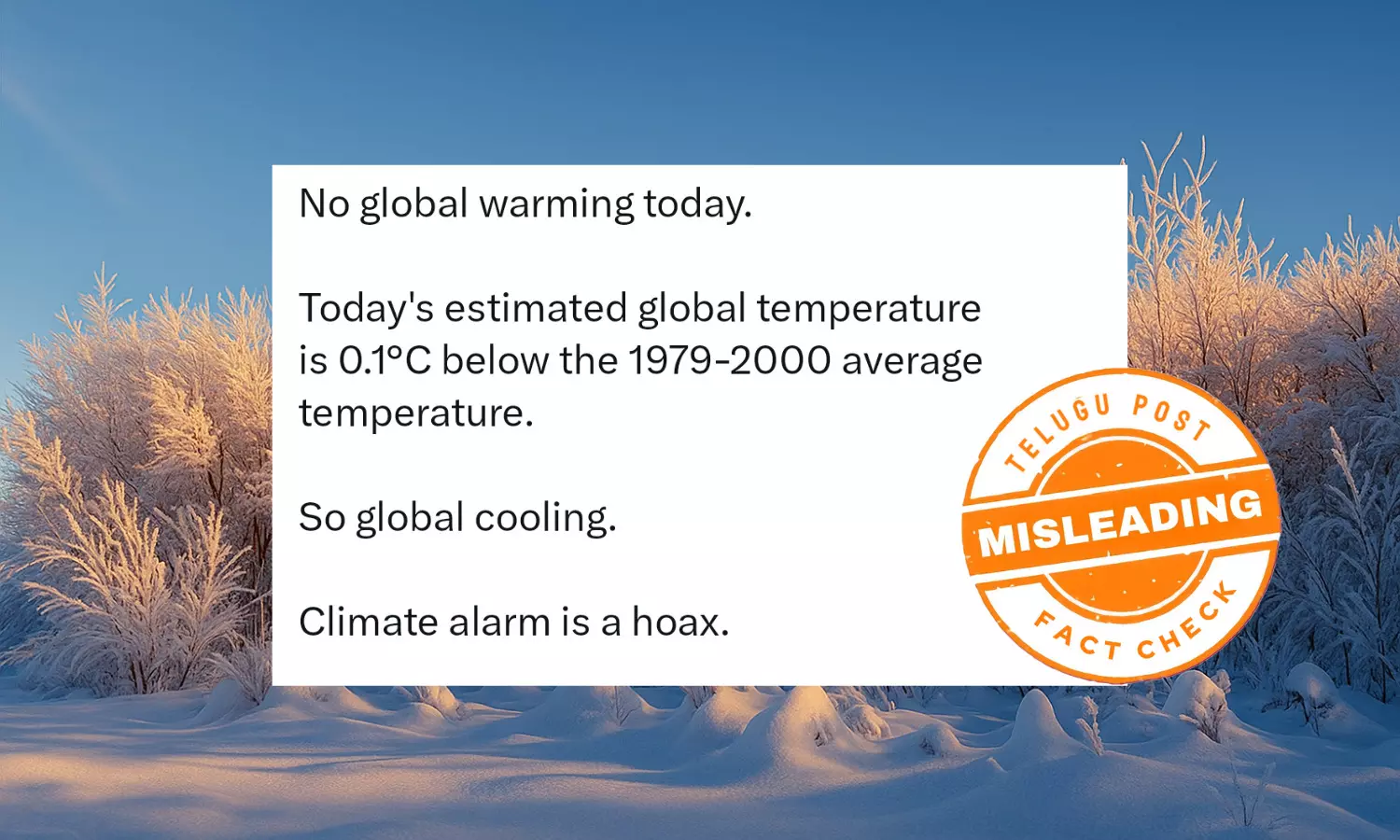Fact Check: Cold Weather Doesn’t Disprove Climate Change
The claim is Misleading. A single cold day in one location does not disprove global climate change, which is based on long-term trends in temperature and weather patterns across the globe.

Claim :
It’s cold today, so climate change isn’t realFact :
Weather is local and short-term. Climate is global and long-term
Climate change refers to long-term shifts in temperatures and weather patterns. While such changes can occur naturally due to variations in solar activity or significant volcanic eruptions, scientists agree that since the 1800s, human activities have become the dominant cause of global warming.
The main contributor to this human-driven climate change is the burning of fossil fuels such as coal, oil, and gas. This process releases greenhouse gas emissions, which act like a heat-trapping blanket around the Earth, significantly increasing global temperatures. Carbon dioxide and methane are among the primary greenhouse gases responsible for this warming. These emissions stem from everyday human actions, including driving vehicles that run on gasoline and using coal to heat buildings. Additionally, deforestation releases large amounts of carbon dioxide, while agriculture, along with oil and gas operations, are major sources of methane.
Key sectors contributing to greenhouse gas emissions include energy production, industry, transport, buildings, agriculture, and land use. Together, they have propelled a dramatic rise in atmospheric greenhouse gas levels over the last two centuries.
Climate scientists have determined that human activities are responsible for virtually all the global heating observed in the past 200 years. This warming trend is occurring at a rate unmatched in at least the last two millennia. The Earth's average surface temperature has increased by about 1.2°C since the late 1800s before the industrial revolution and is now warmer than at any point in the last 100,000 years. The decade from 2011 to 2020 was the hottest on record, with each of the last four decades being warmer than any previous decade since 1850.
Although rising temperatures are a central concern, climate change affects much more than just heat levels. The Earth operates as an interconnected system, and a shift in one component inevitably impacts others. The wide-ranging effects now include intense droughts, water scarcity, severe wildfires, rising sea levels, widespread flooding, melting polar ice, catastrophic storms, and a marked decline in biodiversity.
As evidence mounts, experts urge swift and comprehensive action to reduce emissions and transition to sustainable practices to avoid the most severe consequences of climate change.
Amid this, a text is surfacing on social media claiming, 'Global cooling' and calling climate alarm a hoax.
The screenshot of the claim is mentioned below.
Fact Check:
The claim is Misleading. Just because it's cold in one place on one day doesn’t disprove global climate change, which is about long-term trends in temperature and weather patterns worldwide.
While discussing this claim with a climate expert, he informed us... It is important to understand the fundamental difference between weather and climate when discussing climate change. Weather refers to the short-term atmospheric conditions in a particular location, such as rain, snow, sunshine, temperature, or wind, which can vary from day to day. Climate, on the other hand, describes the average pattern of weather observed over a long period, typically 30 years or more, across a broader geographic area or even the entire planet.
The misconception that a cold day or a brief spell of cool weather disproves global warming or climate change is scientifically inaccurate. Climate change is about long-term shifts and trends in temperature, precipitation, and other atmospheric conditions. One cold day or even a colder-than-usual season in a particular region does not contradict the overwhelming scientific evidence that the Earth's climate is warming over time. Short-term weather events must not be confused with the broader, long-term patterns that define climate behavior.
While searching with the keywords, we found an article published by the David Suzuki Foundation titled, ‘While parts of North America are experiencing record cold, places like Australia are seeing record-breaking heat. Globally, the past four years have been the hottest on record, and the warmest 20 have occurred over the past 22 years.’
In the article, the researcher cites a study, and says, “severe winter weather is two to four times more likely in the eastern United States when the Arctic is abnormally warm than when the Arctic is abnormally cold.” Winters are also colder in northern Europe and Asia when the Arctic is warm. The opposite is true in western North America, where severe winter weather is more likely “when the Arctic is colder than normal.” The effects are more pronounced when Arctic warming reaches beyond the surface, causing disruptions in the stratospheric polar vortex.
Warmer temperatures can also lead to increased precipitation, which falls as snow when temperatures drop below freezing. As a Scientific American article notes, warmer temperatures in winter 2006 prevented Lake Erie from freezing for the first time in history, which “led to increased snowfalls because more evaporating water from the lake was available for precipitation.”
Melting ice in the Arctic, Antarctic, and on glaciers exposes land or sea, creating feedback loops, as dark surfaces absorb more solar heat than ice and snow, which reflect it. This accelerates warming.
So, no, a cold day where you live isn’t evidence that global warming is a “hoax.” Scientists worldwide agree: As humans continue to burn fossil fuels and destroy areas that absorb carbon dioxide, like forests and wetlands, the planet’s average temperature will keep rising, with undeniable consequences for human health and survival, as well as for the biodiversity life on which we rely.
A study in Science Advances predicts extreme weather events could increase by 50 percent this century if we don’t bring emissions under control. It’s time to take this seriously.
An organization named Climate Central, which is working on researching and reporting the science and impacts of climate change, published a post on ‘Winter Losing its Chill’. In the post they mentioned, from 1970 to 2021, the longest winter cold snaps shrunk for 97% of the U.S. locations in this Climate Central analysis... by 3 weeks in Las Vegas and two in Peoria and Topeka.
Even prominent media outlets like Forbes and CNN have published articles on this topic. In their articles, they mentioned that record cold doesn't disprove global warming.
Hence we found the claim is Misleading. A single cold day in one location does not disprove global climate change, which is based on long-term trends in temperature and weather patterns across the globe.

